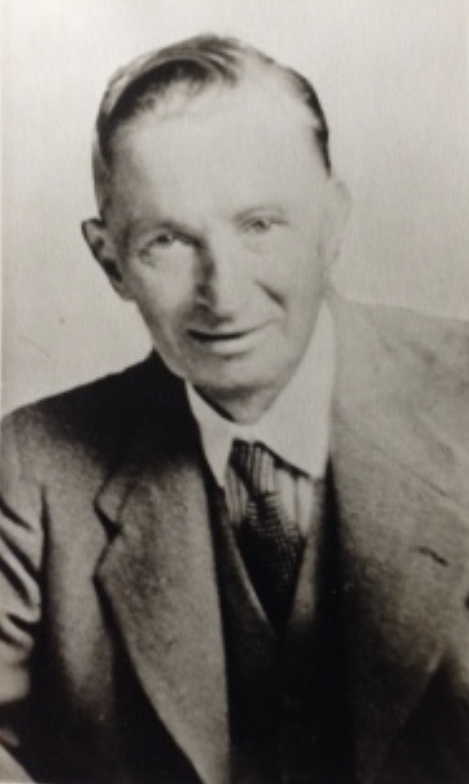
Meet my ancestor, Charles BENNETT 1881-1960, known to many as ‘Charlie’. He was my Great Grandfather on my mother’s side. This is actually a very special introduction because the identity of this particular ancestor has not been known to me, my family, or even my Grandmother, his illegitimate daughter, until now. I have only been able to discover his identity because of DNA testing and kind help from some of his descendants.
My Grandmother was Mary BRINE nee MAPLESDEN and she was born ‘out of wedlock’ in 1911. She spent her whole life never knowing who her father was, let alone ever having any kind of relationship with him. This was largely because her mother would never tell her any details of who he was. She had her suspicions about his identity, even having an idea about his surname, but nothing concrete was ever known for sure. Her mother Rosa MAPLESDEN, with whom she had a very difficult relationship, was not forthcoming with any helpful information and took it to her grave.
In 1988, shortly before my Grandmother died, she wrote her autobiography which she called “Hopwood Street to Wellington Lane“. It was published posthumously. In her book, she recounts how as a young child she had been desperately curious to find out who her father actually was. She wrote
“I was becoming increasingly curious as to the mystery attached to the circumstances of my origin. Who really was my natural father?”
Sadly my Grandmother died without ever getting any answers, but I would like to think that she would appreciate that we may well have finally solved this great family mystery.
How DNA Testing Led Me to Charles Bennett
In recent years, DNA testing and online research has opened up new avenues for uncovering such family secrets and I recently embarked upon a mission to establish just who my Grandmother’s father, my own Great Grandfather, actually had been. I felt sure that this was possible, even though the various parties who knew the truth were all long gone. I began my genealogical journey by looking at the clues available from old family stories and looked again for pieces of the puzzle in my Grandmother’s own words, in her book which is a real gem to have as a family.
Eventually, I managed to establish the family that it seemed most likely my mystery Great Grandfather had come from. You can read about my investigations in my previous post “Is that you Mr Bennett?” and my follow up post “In My Grandmother’s Own Words”. Eventually the picture became clearer and clearer, and DNA testing then finally confirmed his identity by matching my DNA with the DNA of other known descendants of this mystery man’s family. So I think I can finally provide an answer to the mystery of just who my Grandmother’s father was.
Introducing My No-Longer-Mystery-Ancestor
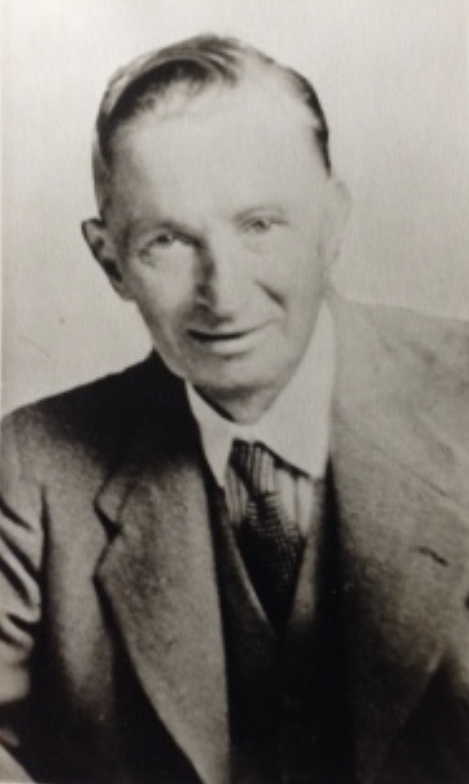
Charles BENNETT, known to most as Charlie, was born to a Jewish family in Hull, in 1881. He was the second son of Hull based plumber and glass merchant Harris BENNETT and his wife Leah BENNETT who had themselves migrated over to Kingston-Upon-Hull in the UK having fled Lithuania to escape rising anti-semitism in Europe.
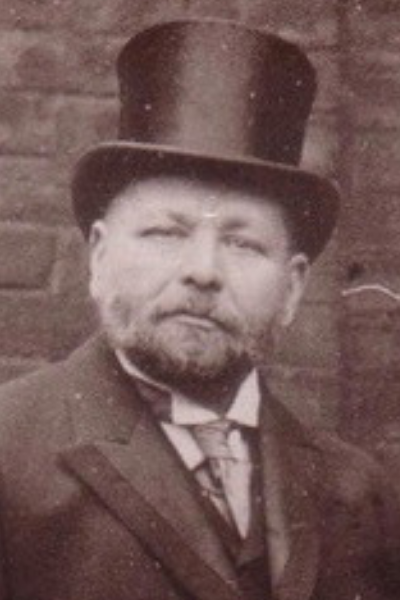
Harris BENNETT – My Great Great Grandfather 
Leah BENNETT – My Great Great Grandmother
The Bennett family were Russian/Lithuanian Ashkenazi Jews by origin. Harris’ father, Charles Bennett’s Grandfather, was a man named Eliezer Berel (Louis Baer) PRZEMISLOWSKI. He was originally from the Russian partition of Lithuania which was where Harris Bennett had been born and raised before moving to the UK as an adolescent.
By the end of the 19th century, many members of Lithuania’s Jewish community, having sought to escape persecution, had emigrated from Eastern Europe to the ‘New World’. Rising conflict, and growing anti-Semitism promoted by Russian Czars meant that it would have seemed much safer to do so. Millions of Jews, including tens of thousands of Lithuanian Jews, emigrated to the United States, and some of the Bennett family are known to have headed over to the USA and begun a family line over there. Many Lithuanian Jews emigrated to South Africa and a small number also emigrated to the British Mandate of Palestine. My three times Great Grandfather, Eliezer Berel PRZEMISLOWSKI, moved with his own young family to the North East of England, where they all eventually settled in Kingston-Upon-Hull.
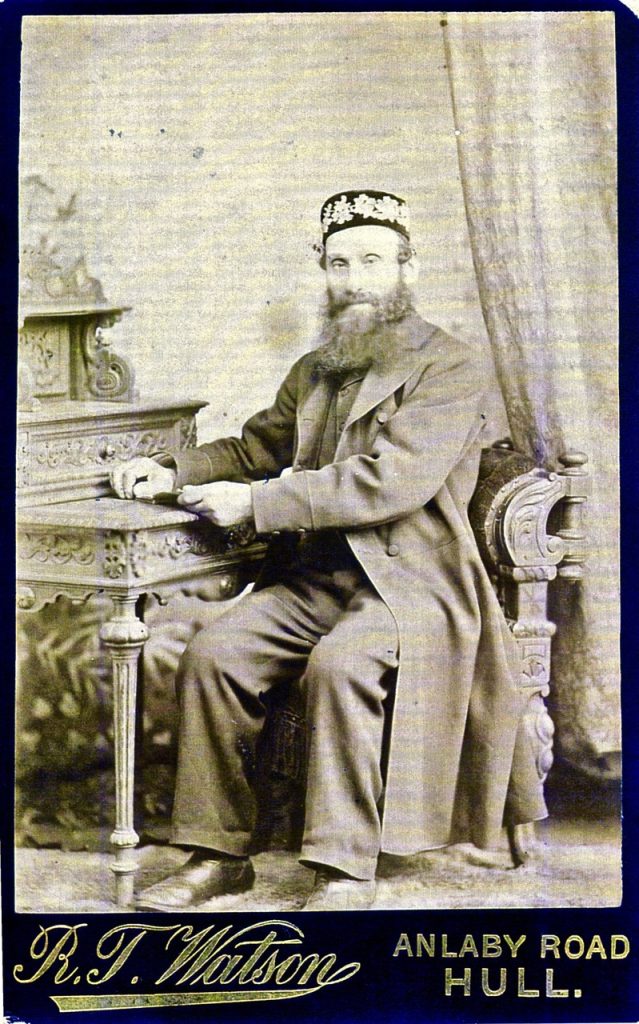
On my research journey, I managed to make contact with another of Eliezer’s descendents, a man named Alan BENNETT (who’s own family line had been established over in the USA). He very kindly put me in touch with another fellow descendent of the Bennett family who was based in the UK. This descendant, Elaine BENNETT, was directly descended from Harris Bennett of Hull. In fact, she told me that she was one of Charles Bennett’s Granddaughters. Hence, it soon became clear that her father, Mark Bennett, had actually been my Grandmother’s half-brother, though my Grandmother never gave much though to the fact that she had other half brothers and sisters, to my knowledge.
Elaine Bennett told me that when the Bennett family first migrated and settled in England, they were not initially given the name BENNETT on their arrival. She said they were initially called BENDET, then BENDARD, BARNET and then finally BENNETT. This makes researching the family at this crucial point in our family history, somewhat challenging.
In 2020, I was contacted by another Bennett descendent, a gentleman named Sefton BENNETT. He told me that he was actually a Grandson of Harris and Leah Bennett, his own father having been their youngest son, Louis BENNETT. Sefton is, therefore, most likely my Grandmother’s half cousin, though he told me he’d never had a clue about her existence until he came across my blog and website by accident, and learned about her here.
Sefton told me that Harris Bennett had moved over to the UK as a young teenager, having already met a young woman, Leah ZIMINSKY, back in Lithuania. He recalled that there was some belief in the family that his Grandmother Leah had already become pregnant while in Lithuania, and that she feared Harris may abandon her to the fate of a young single mother. However, Harris Bennett settled in the UK, and she later followed and married him here in the UK. Harris would go on to run a plumbing and glassworks business in the city and as a family, they would have several children.
The Bennett Family
Harris and Leah Bennett had their first child on 18th December 1879, a son, and they named him Abraham BENNETT.
Following this, in 1880, their second son, Charles BENNETT known as ‘Charlie’, was born. Harris and Leah went on to have several more children together, until there were ten in total, so Charlie grew up in quite a large family with six brothers and three sisters. Sefton told me that, although he never actually met his Grandparents Harris and Leah himself, because they died before he was born, he knew Harris to have been a very strict ‘Victorian’ kind of father and believed Leah to have been somewhat softer and more forgiving towards her children, in the way that perhaps Victorian families were not uncommonly characterised.
By 1891, the census shows that Charles, now aged 10, was living with his parents Harris and Leah, at a ‘Glaziers Shop’ at no. 9 Lime Street, Hull. His older brother, Abraham (12) and younger siblings Jacob (8), Isaac (6), Sarah Ann (4) and Simon (2) were all there too.
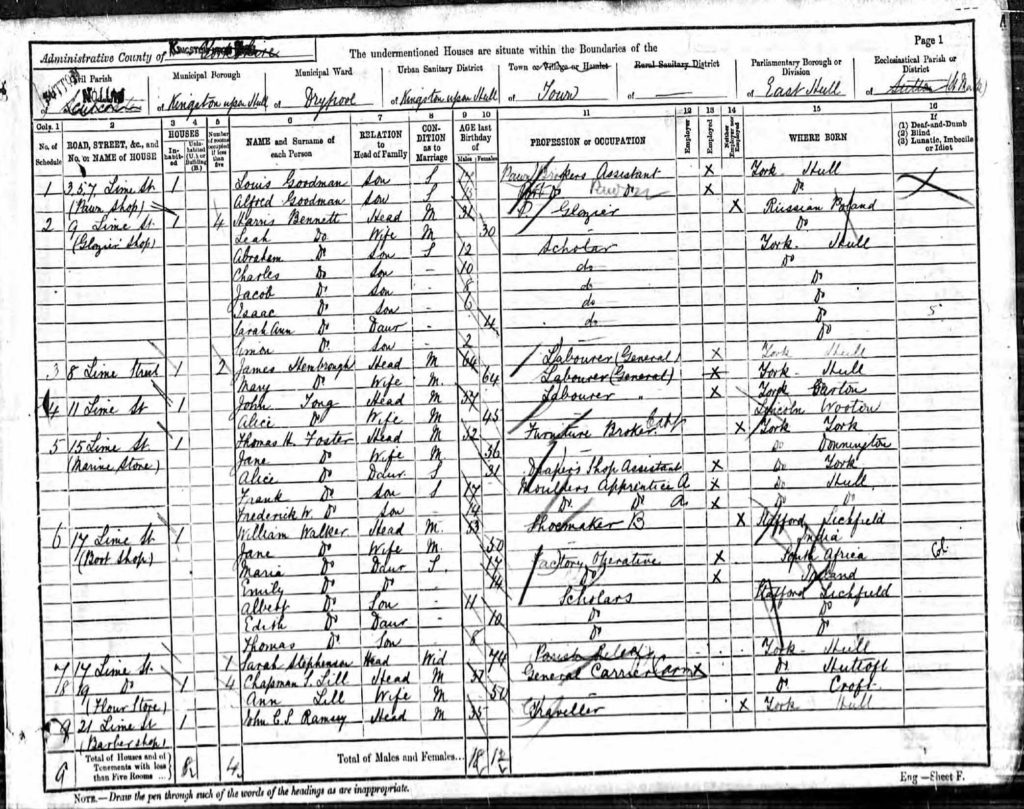
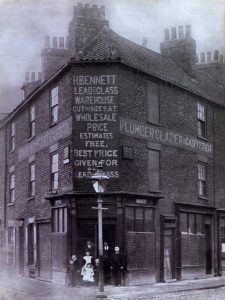
I was informed by Sefton BENNETT, grandson of Harris BENNETT, that Charles or ‘Charlie’ BENNETT is the second oldest of the BENNETT children pictured here. He is standing to the right of the lamp post, wearing a bowler hat positioned to one side, and a tie and watch. His older brother, Abraham BENNETT stands to the back left of the picture. His younger siblings are likely to be Jacob BENNETT on the far right, Sarah BENNETT third from left, Simon BENNETT second from left, with the remaining children Simon, Philip and Rosey BENNETT also pictured
Charles Bennett’s Working Life
Charles’ Granddaughter Elaine, told me that all three of the first Bennett sons followed their father into the family trade. They all trained as plumbers and glaziers and helped their father in the glass merchant trade while they were growing up.
The Census in 1901 shows Charles, by now aged 20, listed as a plumber, just like his father and older brother. They were all living together by this time at number a Glass Works at 55 Dock Street, Hull. Charles was a young man, still living with his parents Harris and Leah, and his eight brothers and sisters.
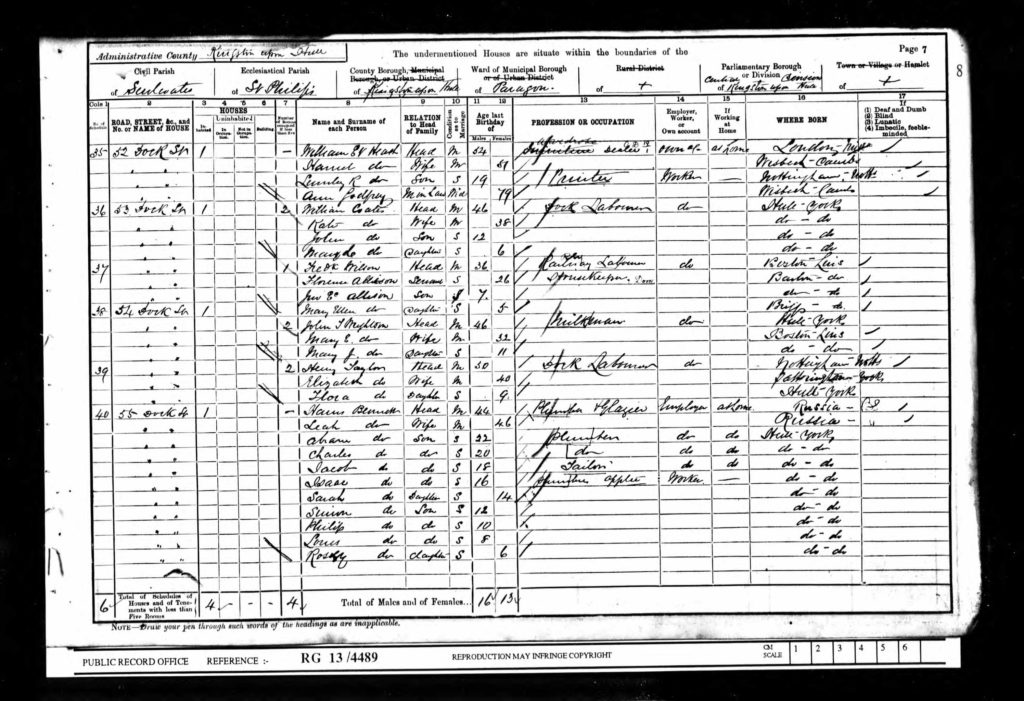
At some point, Charles established himself as a plumber and glazier in his own right. He started his own shop at number 116 Osborne Street in the Hull City Centre. Sefton Bennett told me that unfortunately the brothers were all quite competitive with each other, and also with their father. As a result, none of them were ever as successful as they might have been if they’d co-operated more and been less competitive with one another. He recalled in particular, that the eldest son Abraham, would actually bid up his own father at the local auction whenever they were purchasing goods. Nevertheless, the Bennett family name was associated with glassworks and locals businesses for many years in the Kingston-Upon-Hull area.
Charles Marries and Has a Family
In 1907, Charles married a young woman named Sarah Leah GOLDSTEIN who was generally known by the name ‘Leah’ mainly. She is not to be confused with Charles’ own mother, who was also called Leah. Sarah/Leah had come from a Jewish family who also had Lithuanian origins, but they had settled in Leith in Scotland when they’d emigrated over to the UK.
Charles and Leah Bennett soon had their first child together, a daughter who they named Ena BENNETT. They then had a second child, but sadly this child did not survive. In 1901, they had a son, Mark BENNETT.
The census in 1911 shows that Charles, listed as a plumber, is, by this time, 30 years old and living with his wife Leah and their two surviving children, Ena (4) and Mark (1). Also living with them is a Tailor named Daniel GOLDSTEIN, who may well have been a brother or relative of Leah since her own maiden name was GOLDSTEIN.
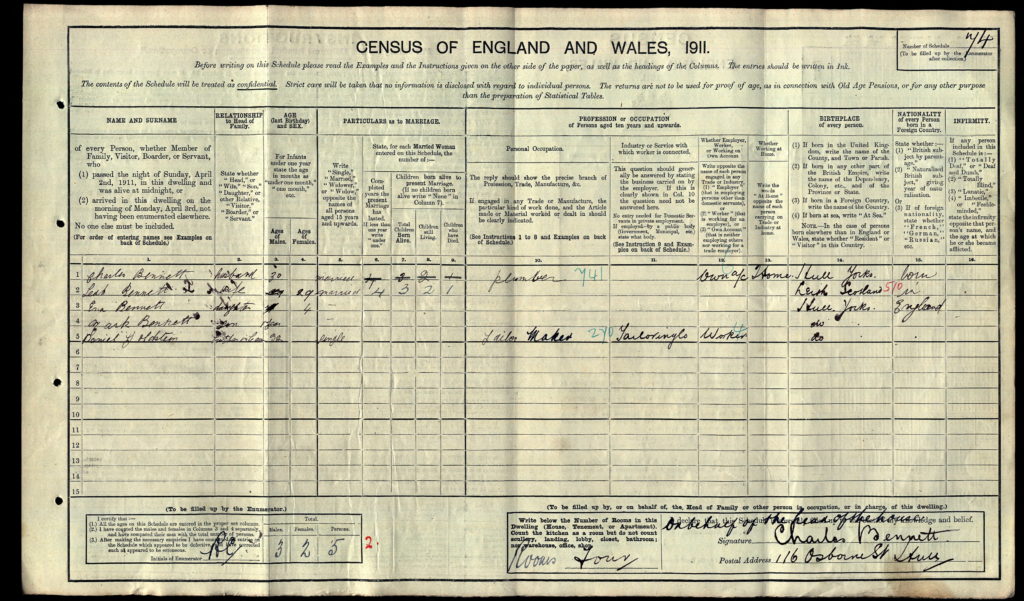
Meanwhile, Charles’ father Harris Bennett continued to run the shop in Dock Street, and his older brother Abraham was now running his own shop on Anlaby Road in Kingston-Upon-Hull too.
A Secret Liaison
At some point in 1911, while married to Leah, Charles must have had extra-marital relations of some kind with a woman named Rosa MAPLESDEN. She was my Great Grandmother. We know this must have occurred because she became pregnant with my Grandmother, Mary BRINE nee MAPLESDEN. Rosa was, at the time, aged just 21 and she had been working as a Domestic Servant. She had been living in, and working for, a well-to-do family who lived on the then affluent and leafy Anlaby Road in Kingston-Upon-Hull. However, Rosa’s family home was in the Hopwood Street area near the City Centre, which was just around the corner from Charles Bennett’s Glass shop on Spring Bank in Kingston-Upon-Hull.
In September 1911, Rosa’s daughter, Mary was born scandalously, out of wedlock. Rosa named her Mary, most likely after her own mother Mary, and gave her the surname Maplesden which was still her own surname as she was still unmarried, and the surname of her mother.
Charles did not have any contact with the baby, and there seems to have been little contact between him and Rosa because his identity was not even known by members of the Maplesden family. However, it would seem that Rosa did hold him somewhat accountable, as she is believed to have claimed child support for her daughter. Nevertheless, she can’t have received a great deal of financial support because Rosa had to continue to work in service. She would do so for another seven years.
Meanwhile, the young Mary was raised, for the first seven years of her life, by her maternal Grandmother Mary Emma MAPLESDEN. She tells the story, in her autobiography ‘Hopwood Street to Wellington Lane’ written in later life, of how she loved her Grandmother dearly. She also explains that she was utterly distraught when, at the age of seven, she learned that Rosa was in fact her mother, and she was forced to go and live with her which she very much did not want to do.
Mary would never discover who her father actually was, even though she very much wanted to know and tried on several occasions to find out. She does recount how she may have met him, just once. She tells the tale (which you can read more about “In My Grandmother’s Own Words”, that while she was out and about with her mother one day, she was introduced to a man. The man kindly gave her a penny, and she was told afterwards that it had been her father. Charles Bennett’s nephew, Sefton, told me that when he’d been a child himself, whenever he’d seen his uncle, he would always give him a coin. So he said that this account of my Grandmother’s, sounded exactly like the very kind of thing he would do.
Tragedy Strikes
Following his relations with Rosa in 1911, Charles remained married to his wife Sarah Leah Bennett, and they went on to have three further children, Edgar, Betty and Lawrence.
In 1918, however, it seems that the Bennett family were experiencing financial difficulties. This must have been extremely stressful given that they had six very young children to feed and look after. This same year, Charles moved his business from Osborne Street to another shop at number 50, Spring Bank.
My Grandmother Mary, recalled in her autobiography that at around this time, some considerable conflict arose about the issue of non-payment of child support to her mother. You can read about the events that she could remember in my post “In My Grandmother’s Own Words”. She says that a court case ensued, due to non-payments from her natural father, and that one day, a woman who she believed to be her father’s wife came to her house and demanded to speak to her mother. She had with her, six young children in tow.
Mary recalled that the woman angrily confronted her mother Rosa and suggested that she should leave her and her husband alone as they had many mouths to feed and Rosa was now settled with a husband and security of her own. Rosa however, did not appear to be prepared to drop her case. It is likely that the woman my Grandmother recalled making this confrontational visit, was Leah, Charles’ wife. Sefton Bennett has since told me that she had most likely recently discovered that she was pregnant with her seventh child at that time. A fact that was likely to have been unwelcome news given that the family were in financial difficulty and the youngest of her six existing children was only five months old.
A Very Sad Turn of Events
During my research, and thanks only to the willingness of Bennett descendants to share family information with me that was never officially recorded, I learned that very very tragically, Leah actually died shortly after the unpleasant encounter with Rosa. She passed away at the age of just 37 on 20th November 1918 in exceptionally tragic circumstances.
Sefton Bennett told me (during a conversation in 2020) that Leah had actually died due to a ‘botched DIY’ procedure while attempting to terminate her pregnancy. It should be remembered of course, that at this time, women did not have access to contraception. Nor did they have access to legitimate or medically safe procedures if a pregnancy was deemed unwanted or untenable due to financial hardship in the family. So sadly, this was not an especially uncommon occurrence. Perhaps Leah felt strongly that they couldn’t afford another mouth to feed and that trying to do so could place her existing six children at greater risk.
Unfortunately, her tragic decision, at some point following her confrontation with Rosa, resulted in the poor woman losing not only the life of her child, but also her own life, at the age of just 37. This left her existing six children, the youngest of whom was only five months old, without a mother.
It must have been a terrible loss for the Bennett family, and I can’t help but wonder whether the altercation my Grandmother remembers having witnessed as a young child, and the reportedly unfeeling and rather compassionless response from Rosa, was in some way related to this sad and tragic turn of events.
By anyone’s estimation, a woman who has found herself burdened by an un-planned pregnancy that she feels ill-equipped to cope with, who cries out for compassion and consideration from another woman, only to be met with cold indifference and a greater import placed on her own needs, must have felt extremely desperate. I imagine she felt that she was lacking in any options, a devastating place for any young pregnant woman to find herself in.
It is a strange thing, since many many years have passed, and no one involved in any of these actual events is around today, but I do feel a strange urge to offer my condolences and to express some remorse on behalf of my Great Grandmother for what can only have been compassionless behaviour born out of either, a complete lack of understanding and appreciation for just how desperate Leah must have felt, or a clouding of her judgement at a time when she was faced with an ethical dilemma that pitted her own needs against another’s.
I tend to be of the opinion that it is never too late to say sorry, even when there are many reasons why it might be considered that someone can hardly be held responsible. So reader, know that I feel sorry about these sad events as they unfolded. In reality, two desperate women, perhaps both feeling abandoned and unsupported by the same man, and with limited resources to go around, found themselves placed at odds with one another. A great loss and tragedy was the result, and although history can not be turned back, perhaps old ghosts can be laid to rest and some sense of healing and peace can be achieved by an acknowledgment that a deeply upsetting turn of events ensued that was no one person’s fault, but that nevertheless, could have benefited from more compassion and understanding all round.
I think of those motherless children, and I hope for them and wish them well. I think of Leah and her great suffering, and I hope she’s at peace. And I think of Rosa, being somewhat without compassion for others at times, and as a result falling somewhat into the role of ‘black sheep’ and ‘villain’, but perhaps being as much a victim of her own life’s circumstances, and others letting her down or failing to support her, just as much as anyone else in the situation. And I hope and pray that everyone may rest in peace.

Charles’ Later Years
Sefton Bennett told me that after the loss of his wife, and the mother of his children, Charles never re-married. Instead, the children were frequently cared for by their grandparents Harris and Leah Bennett. Sefton recalls that his own father, Louis BENNETT, who was a much younger brother of Charles, would often help look after the young motherless children and try to entertain them.
Following the death of his wife, Charles Bennett continued to run his business on Spring Bank in Kingston-Upon-Hull. Sefton described from his own memories of his uncle Charlie that he had been a real ‘Character’. He told me he was a bit of a comedian, and something of a ‘wheeler dealer’. He remembered that he liked to make rather inventive deals and trades and that sometimes, they were a little outside of what was proper.
Nevertheless, he also remembered him as being sociable and hospitable. In particular, in 1953, for the Coronation of Queen Elizabeth, Charles was one of the few people locally who owned a television. So Sefton remembers that they all went round as a family to his house for a lovely day’s celebration. They watched the Coronation on his little black and white box together and enjoyed much merriment. However, Sefton also admitted that he recalled Charlie liked to drink a little too much, and he had often been known to have a bottle of Whiskey to hand. Sefton also recalled that Charlie was rather fond of gambling, and spending money in ill-advised ways. This had been a vice that had got him, and most likely his family, into quite a few difficulties.
These tales of Charles, told from Sefton’s own memories of him, interested me greatly and even amused me somewhat. She too was always someone many people referred to as having been a real ‘Character’, and funnily enough, my Grandmother was also known to have been a little too fond of a ‘flutter’. She enjoyed a little gambling with friends and family over a game of cards, and she often had marital arguments about spending too much of her house-keeping money in the local Bingo halls. So the inappropriate spending of money was something of a theme in her own life, and a frequent cause of marital conflict in her own marriage. Yet coins were also something she would frequently give out to delighted children. I remember, personally, from my own childhood, that she was someone who saved coins specifically to give to me whenever I saw her.
My Mother, her youngest daughter, would one day go on to become quite proficient as something of a ‘card sharp’ herself. She would run a local social club and hold ‘penny drives’ in her own home, where friends would come to gather and gamble their pennies away for fun. I recall as a child that I would come downstairs the next morning after one of these home cards nights, and I would hunt around on the carpet for pennies that had been ‘dropped’, probably ‘accidentally on purpose’, for me to find the next day. In later years, my Mother would actually go on to do some part-time work in a ‘Betting’ shop and she told me she enjoyed the atmosphere of excitement and frivolity immensely.
So perhaps Mary inherited a few character traits and interests from her father, without ever actually knowing where they had come from. And some of those traits may well have been passed on down, through the generations, as family traits and tendencies are want to do sometimes.

Charles BENNETT my Great Grandfather. Photograph taken c 1936, therefore Charles is aged around 76 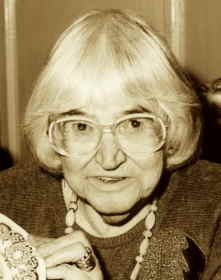
Mary BRINE (Nee MAPLESDEN), my Grandmother. Photograph taken c1987, therefore Mary is aged around 76
Charles Bennett’s Death
Charles Bennett went on to live a long life and reached the grand age of 80. In his later years he enjoyed what his nephew Sefton recalled were frequent visits from a favoured ‘lady friend’ who he believes was named Mrs Needler. However, he never remarried following the death of his wife.
Sefton, who was himself born in 1941, has fond memories of himself and his then elderly Uncle taking bus rides together. He told me he remembers him as a man who was something of a ‘character, a bit of a comedian, but who had also obviously had some difficulties in his life’.
On 19th June 1960, at the age of 80, Charles ‘Charlie’ BENNETT died. He is buried in the Marfleet Lane Jewish Cemetery in Kingston-Upon-Hull.
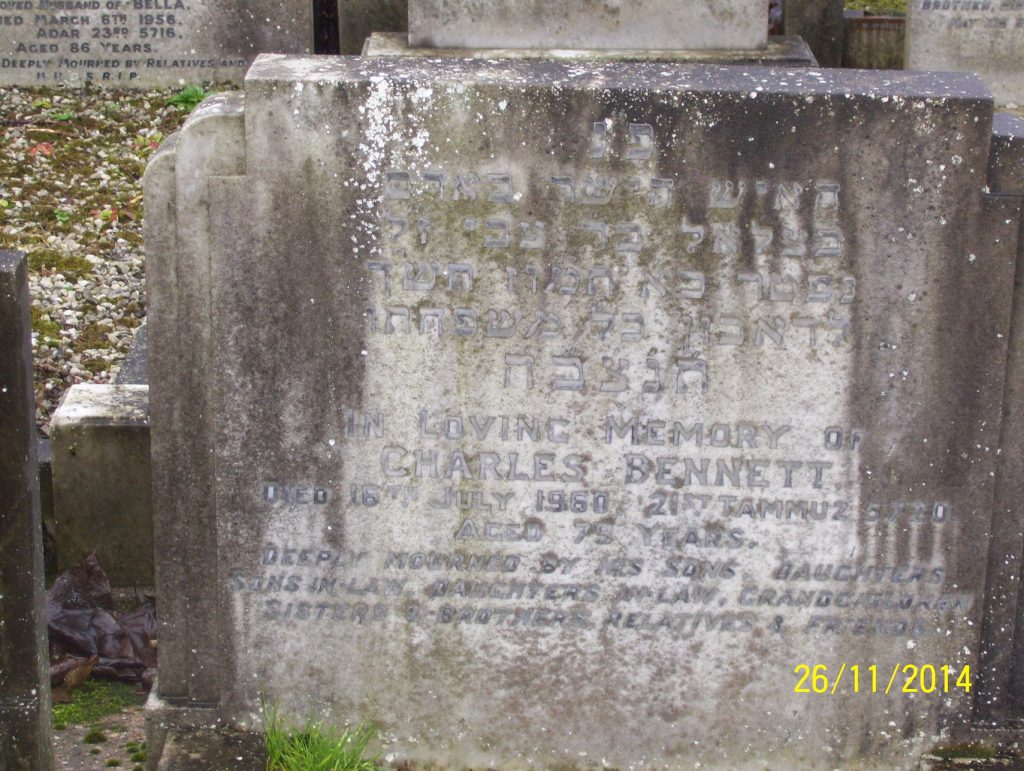
RESEARCH & SOURCES
I would like to express my very greatest gratitude to members of the Bennett family, in particular, Elaine Bennett, Alan Bennett and Sefton Bennett, for their very great kindness and wealth of helpful information. Their willingness to share photographs and help me uncover this very long-held family mystery has meant a great deal.
Sefton Bennett in particular, now aged 77, has given me a wealth of information and was even able to describe to me in some detail his direct memories of his uncle, Charles Bennett. To hear about my Great Grandfather from someone who knew him was a great gift. He confirmed that some of my Grandmother’s accounts sounded very accurate and in particular he was able to match characteristics and facts about the situation which helped to put missing pieces of the puzzle together. It was lovely to hear that the one memory my Grandmother thought she had of her father, a man in the street who handed her a penny, actually sounded just like him, so it was very likely a real meeting in deed. Sefton told me that when he had been a child himself, whenever he would see his Uncle Charlie, he always gave him a coin, so it seems that my Grandmother’s account of her one and only encounter with her father, sounded true to form. This was lovely to hear. Sefton was able to also pass on knowledge of his own Grandfather and Grandmother, Harris and Leah Bennett, my Great Great Grandparents. Again, invaluable.
Were my Grandmother still alive today, I have no doubt she would have very much appreciated the assistance from the Bennett descendants, since they have helped us uncover the identity of her father. Especially since her own mother would never give her the information she so desperately longed and asked for. It is both sad, and poignant, to learn that Charles Bennett ran a glass shop, on Spring Bank in Hull, for so many years as I’m sure my Grandmother must have passed right by it on many an occasion. And it was sad to learn of Charles’ wife’s tragic death, following an altercation with my Grandmother’s Mother. I feel sure my Grandmother would have felt sorry about that, though of course she was not at all responsible.
Moving Onwards Through Time
At the time of writing this (May 2020), we are all currently in lockdown due to the Coronavirus outbreak, but Sefton Bennett and I had a delightful phone conversation and we have planned to meet up just as soon as it is all over. Hopefully we will be able to meet up for lunch, and perhaps together we can visit the graves of Harris and Leah Bennett, our shared ancestors, and also Charles Bennett and his wife Leah. Now that I finally know who my Great Grandfather actually was, I would like to pay my respects, lay some old ghosts to rest, and perhaps take some flowers to symbolise that life continues to bloom.
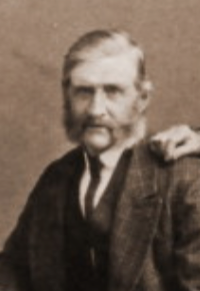
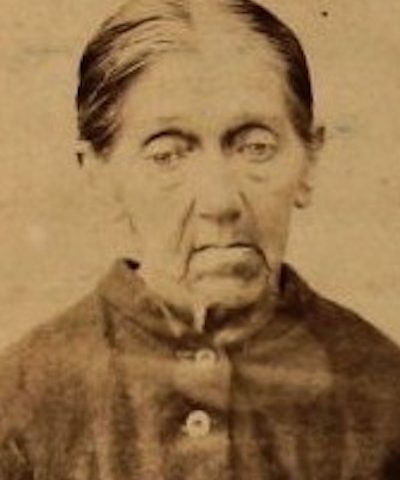
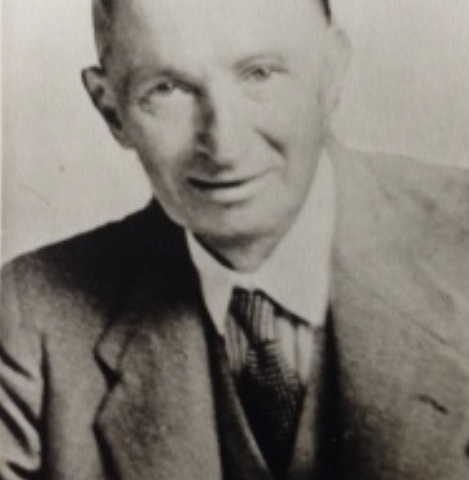
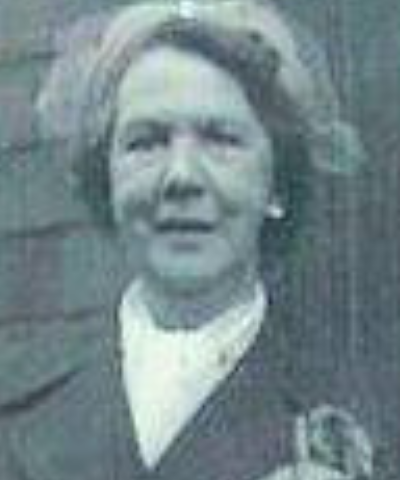
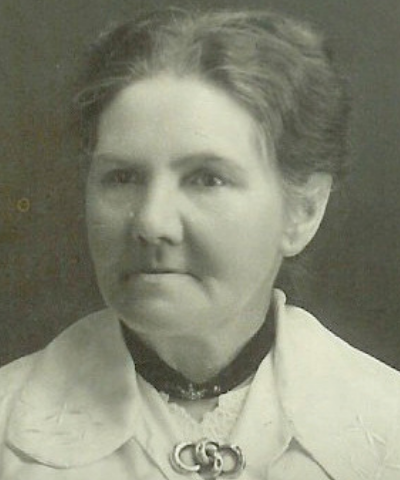
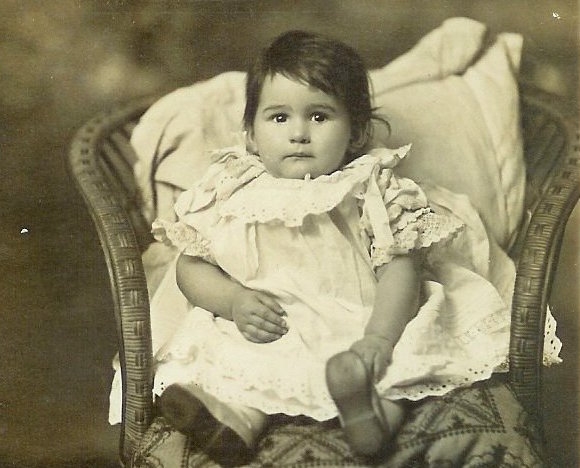
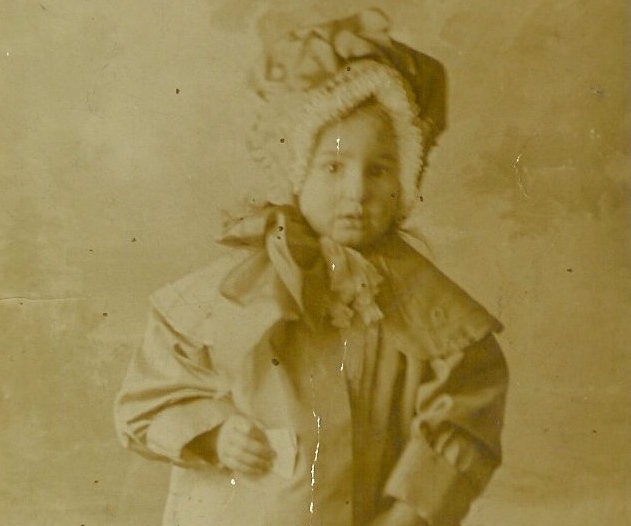
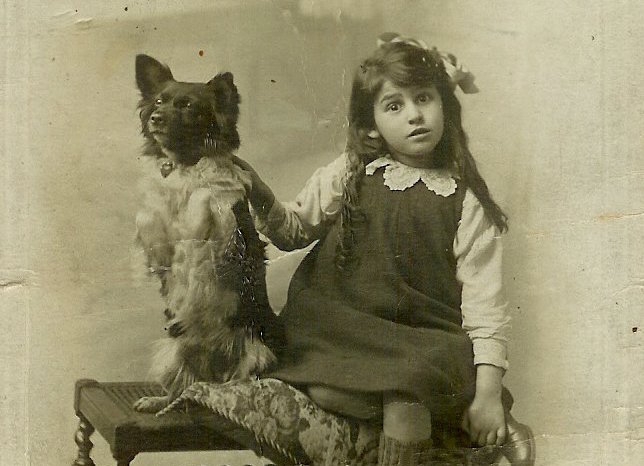
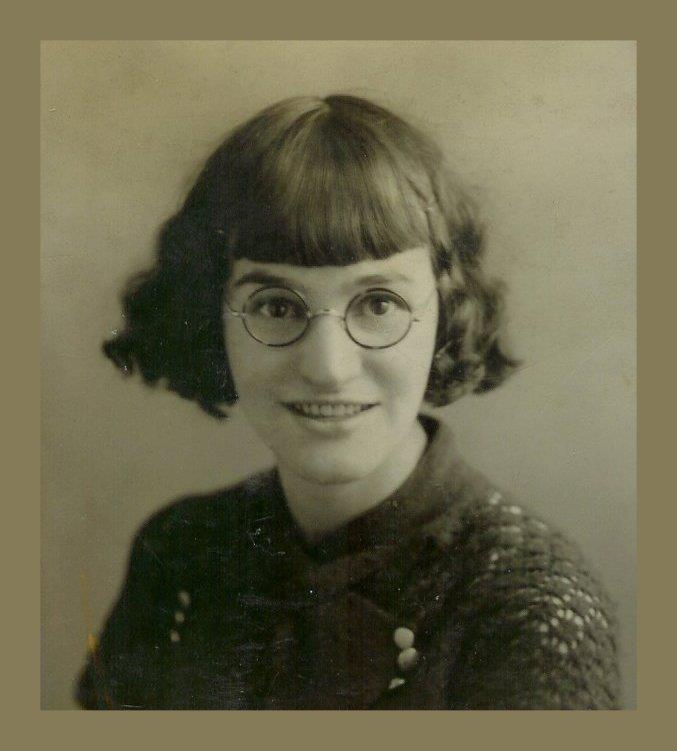
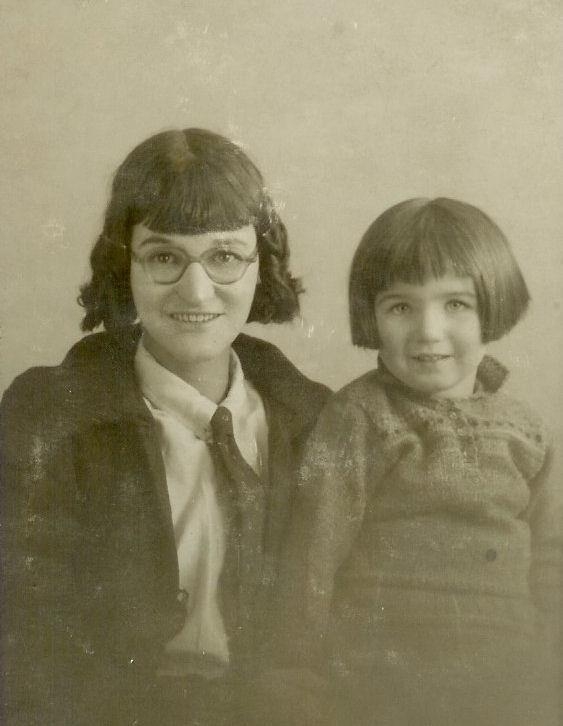

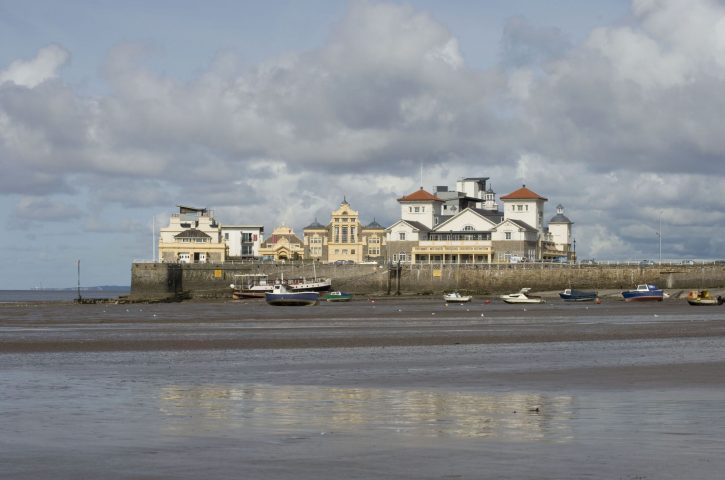
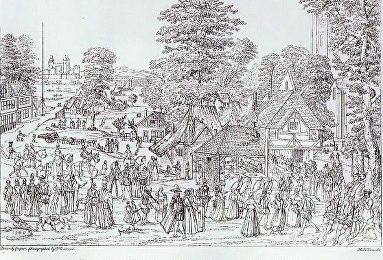
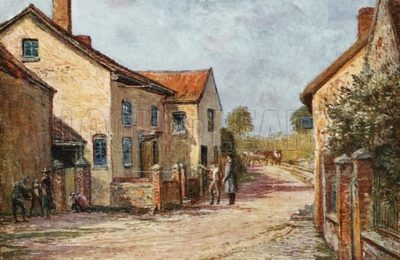
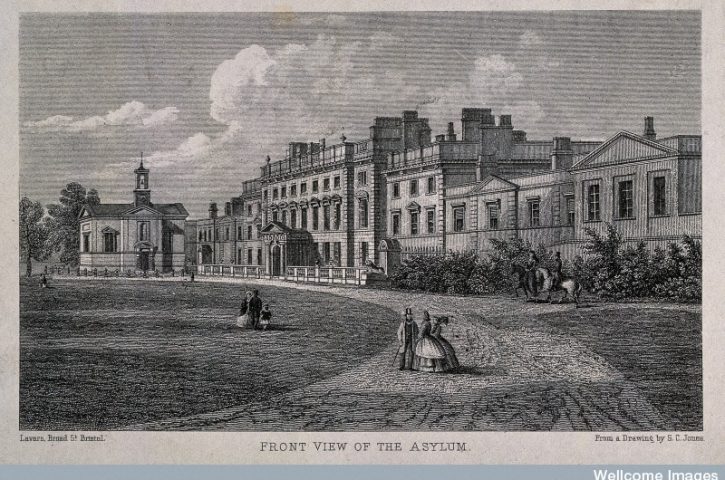
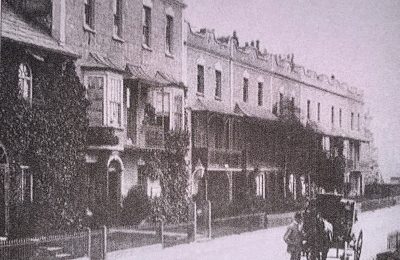
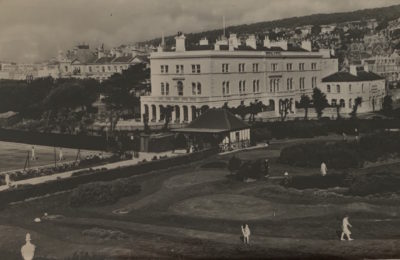
Honey, this is brilliant. My mother (Mary in the narrative) always suspected this was the truth and worked in the Spring Bank glassworks for a few months when she left school but was frightened of being cut by the glass. She always suspected this job was a paternal gift and in later life referred to the boss as Daddy Bennet. But, oh what flesh you have put on the bones of the story I knew. Thank you for your efforts.
I am so pleased you appreciate the research Peter. And that’s so interesting to hear about her short job at the Glass Works on Spring Bank! That’s a complete match. I wonder why he never actually told her then, that he was her father. Perhaps it was just too scandalous back then. It sounds as if he cared about her sufficiently to want to bring her into his business, just as he and his brothers had worked in their father’s business. That’s so lovely. What a shame that she was afraid of being cut by the glass. I guess that is the thing with fear – it sometimes prevents us from connecting with one another and building relationships. This is especially sad when a connection might mean more than we even perhaps realise at the time. It is a lovely thought though that ‘Daddy Bennett’ wanted his daughter to work with him in the business, and even though she didn’t stay, perhaps having a sense on one level, that he wanted the best for her, was all she really needed from him 🙂
I have just had another thought about why Charles might have kept the secret of his daughter’s birth and never come clean. Perhaps, after his wife died, he felt partly responsible for her death? Since the family were clearly in some difficulty, maybe he partly blamed himself for her decision? And then, while raising his now motherless children, maybe he didn’t want any of them to know that he’d had an affair, which had resulted in a child, and that his actions had partly contributed to the eventual death of their mother? Perhaps he worried they might never forgive him? That would go some way towards explaining why he did not feel able to reach out to Mary, my Grandmother, to admit that he was her father. The fact that he paid child support for some time, and then also offered her a job in his business on Spring Bank, suggests that he did actually care about her and want to help provide for her all along. Perhaps, in the same way that Mary feared she might get cut by the glass, he may have been worried that the situation was so fragile, and just like the glass, maybe if he told the truth and let go of the secret, perhaps things might break and someone might get hurt? I feel sure that he wanted the best for her, and his other children. Perhaps he just didn’t feel able to show it.
Dear Peter Brine…. I just came across your family research and found it very interesting and in some ways personal. It’s amazing to hear these scandalous details of events occurring in the early 1900s. It’s somewhat personal due the fact that Abraham Bennett (Charles older brother) was married to my grandfather’s eldest sister Sarah (Adler) Bennett. I was also fortunate to visit Sefton Bennett in Hull and tour the city our family once settled. My grandfather (Sarah’s brother Samuel Adler) subsequently moved from Hull to Montreal, Quebec, around 1904. Samuel had a son (my father Daniel Adler) who later visited the family in Hull during the war while serving for the Canadian Army. My father also shared some interesting background on the family who remained in Hull. My father always reminded me of the evening he visited Abe and Sarah at their home on 9 Boulevard, Hull. The entire evening they sat on the floor under a table while the Germans severely bombed the city. Fortunately they were spared any damage or injuries.
Thank you for showing such a strong interest in research. Feel free to email me anytime if you desire anymore insight.
Hi Adam! I’m so sorry for the delayed reply, I’ve only just seen your comment. Wow! This is fascinating! Especially that you know the address in Boulevard and everything!? I would love to hear any more information you have? Please do feel free to post it here in case anyone else is researching the family and is interested?? Or alternatively do get in touch on honey@meetmyancestor.com 🙂